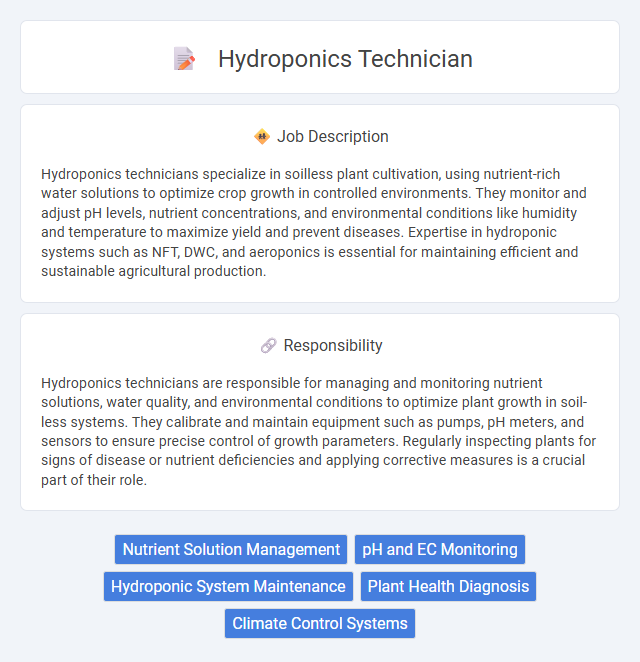
Hydroponics technicians specialize in soilless plant cultivation, using nutrient-rich water solutions to optimize crop growth in controlled environments. They monitor and adjust pH levels, nutrient concentrations, and environmental conditions like humidity and temperature to maximize yield and prevent diseases. Expertise in hydroponic systems such as NFT, DWC, and aeroponics is essential for maintaining efficient and sustainable agricultural production.
Individuals with a strong interest in plant biology and hands-on technical work are likely to find a hydroponics technician role suitable, as it involves monitoring and maintaining nutrient solutions and environmental controls. Those comfortable with precision, attention to detail, and working in controlled indoor environments may adapt well to the job's demands. Physical stamina could be a factor, as the role often requires standing for extended periods and handling equipment regularly.
Qualification
A Hydroponics technician typically requires a background in agricultural science, horticulture, or a related field, often supported by certifications in hydroponic systems or plant cultivation. Proficiency in monitoring nutrient levels, system maintenance, and pest management is essential for ensuring optimal plant growth in controlled environments. Hands-on experience with automated irrigation systems and environmental control technologies enhances a candidate's ability to increase crop yield and maintain sustainable hydroponic operations.
Responsibility
Hydroponics technicians are responsible for managing and monitoring nutrient solutions, water quality, and environmental conditions to optimize plant growth in soil-less systems. They calibrate and maintain equipment such as pumps, pH meters, and sensors to ensure precise control of growth parameters. Regularly inspecting plants for signs of disease or nutrient deficiencies and applying corrective measures is a crucial part of their role.
Benefit
Hydroponics technicians likely experience increased efficiency in crop production compared to traditional farming methods, as soil-less cultivation can optimize nutrient delivery and water usage. This job probably offers the advantage of working in controlled environments, reducing the risk of pests and diseases, which may lead to higher yield consistency. Moreover, the role may provide opportunities for innovation and career growth within the rapidly evolving field of sustainable agriculture.
Challenge
Working as a hydroponics technician probably involves challenges related to maintaining optimal nutrient solutions and environmental conditions that support plant growth. Troubleshooting system malfunctions and preventing disease outbreaks are likely to require constant vigilance and problem-solving skills. The role may demand adapting quickly to new technologies and methods to improve crop yield efficiently.
Career Advancement
A Hydroponics Technician gains hands-on experience managing nutrient solutions and maintaining controlled environments to optimize plant growth. Expertise in cutting-edge hydroponic systems and plant biology enhances opportunities for advancement to roles such as Hydroponics Specialist or Controlled Environment Agriculture Manager. Mastery of automation technologies and data-driven cultivation techniques significantly boosts career trajectory within sustainable agriculture industries.
Key Terms
Nutrient Solution Management
Hydroponics technicians specialize in nutrient solution management by precisely monitoring and adjusting the pH, electrical conductivity (EC), and concentration of essential macro- and micronutrients to optimize plant growth. They use advanced sensors and automated dosing systems to maintain ideal nutrient balance, preventing deficiencies and toxicities in soilless cultivation systems. Expertise in nutrient cycling, water quality analysis, and hydroponic system maintenance is crucial for maximizing crop yields and sustainability.
pH and EC Monitoring
Hydroponics technicians specialize in maintaining optimal pH and electrical conductivity (EC) levels to ensure nutrient availability and plant health in soil-less cultivation systems. Precise monitoring and adjustment of pH, typically kept between 5.5 and 6.5, prevent nutrient lockout, while maintaining EC within species-specific ranges promotes balanced nutrient uptake. Continuous data logging and calibration of sensors are critical tasks to sustain stable hydroponic environments for maximum crop yield.
Hydroponic System Maintenance
Hydroponics technicians specialize in hydroponic system maintenance, ensuring optimal nutrient delivery and water quality for plant growth. They monitor and adjust pH levels, nutrient concentrations, and lighting conditions to maximize crop yield and prevent system malfunctions. Regular cleaning and inspection of pumps, reservoirs, and tubing are essential to sustain a healthy and efficient hydroponic environment.
Plant Health Diagnosis
Hydroponics technicians specializing in plant health diagnosis utilize advanced sensor technology and nutrient film techniques to monitor plant growth and detect early signs of nutrient deficiency or disease. They analyze pH balance, electrical conductivity, and water quality parameters to optimize plant health in soil-less cultivation systems. Expertise in identifying pest infestations and implementing targeted treatments ensures sustainable crop production within controlled environment agriculture.
Climate Control Systems
Hydroponics technicians specialize in managing climate control systems that regulate temperature, humidity, and CO2 levels within indoor farming environments to optimize plant growth and yield. They utilize advanced HVAC technology, sensors, and automation tools to maintain ideal microclimates tailored to specific crop requirements. Mastery of climate control not only enhances nutrient absorption and photosynthesis rates but also minimizes pest and disease outbreaks, ensuring sustainable and efficient hydroponic production.
 kuljobs.com
kuljobs.com